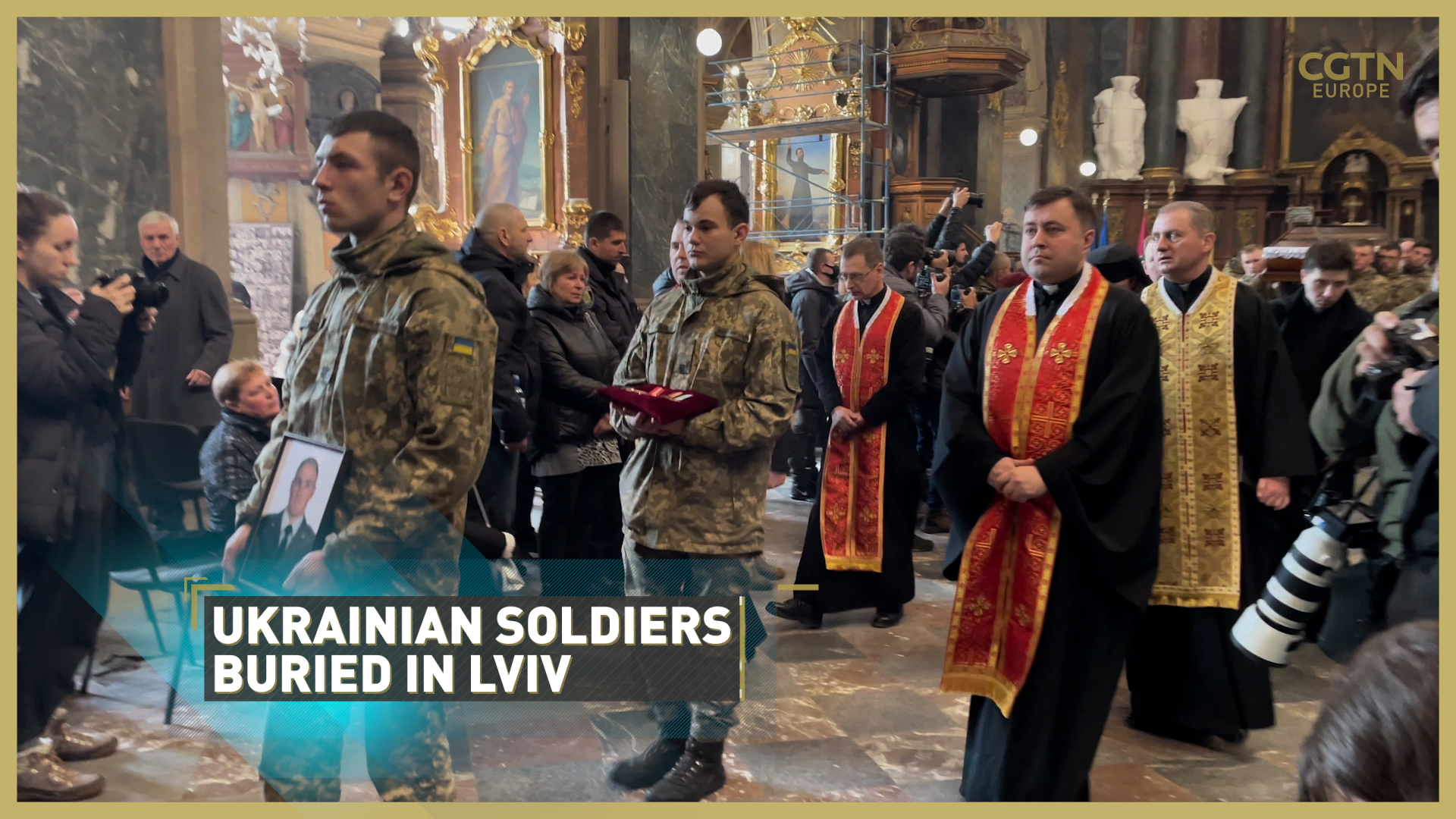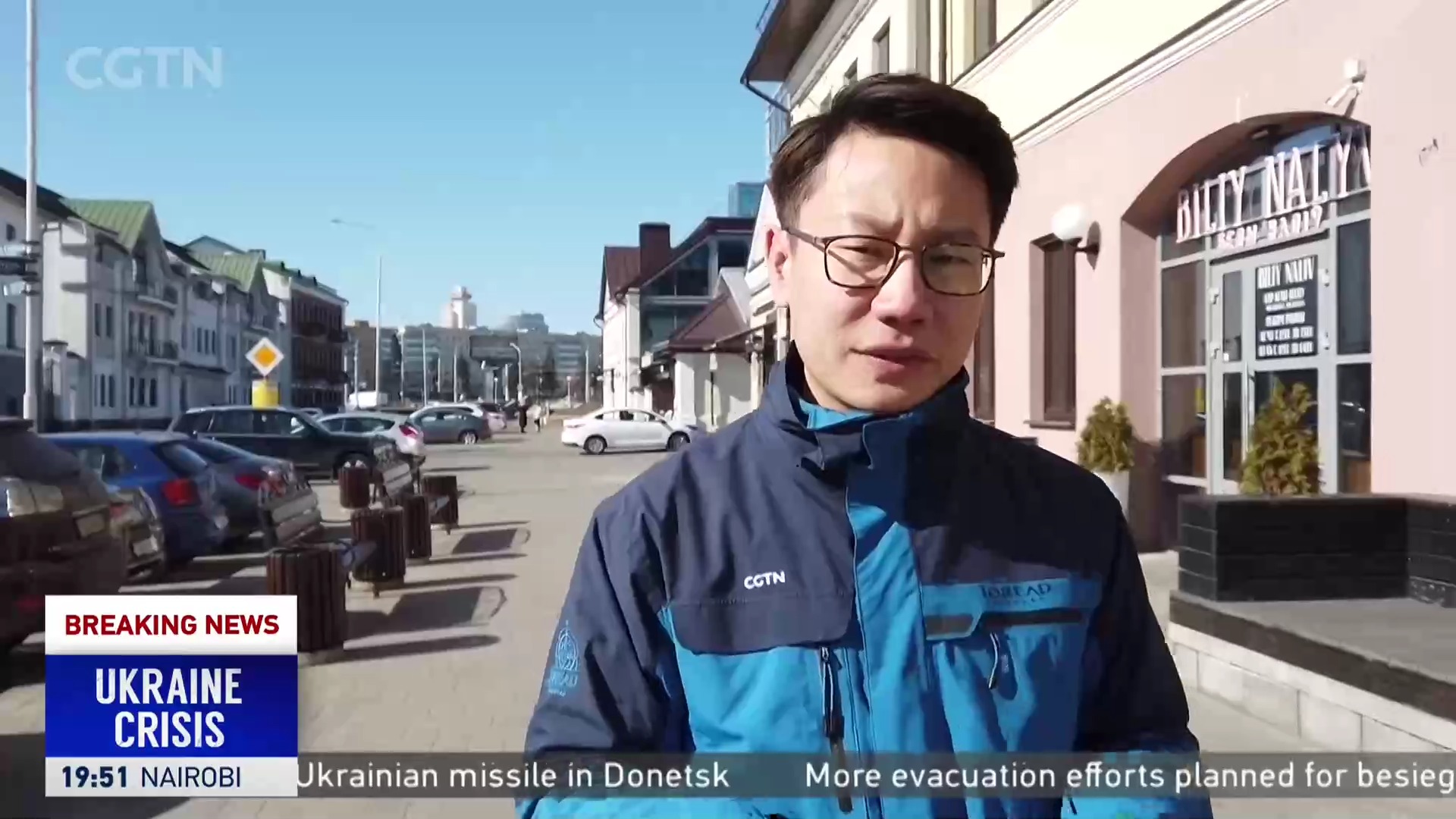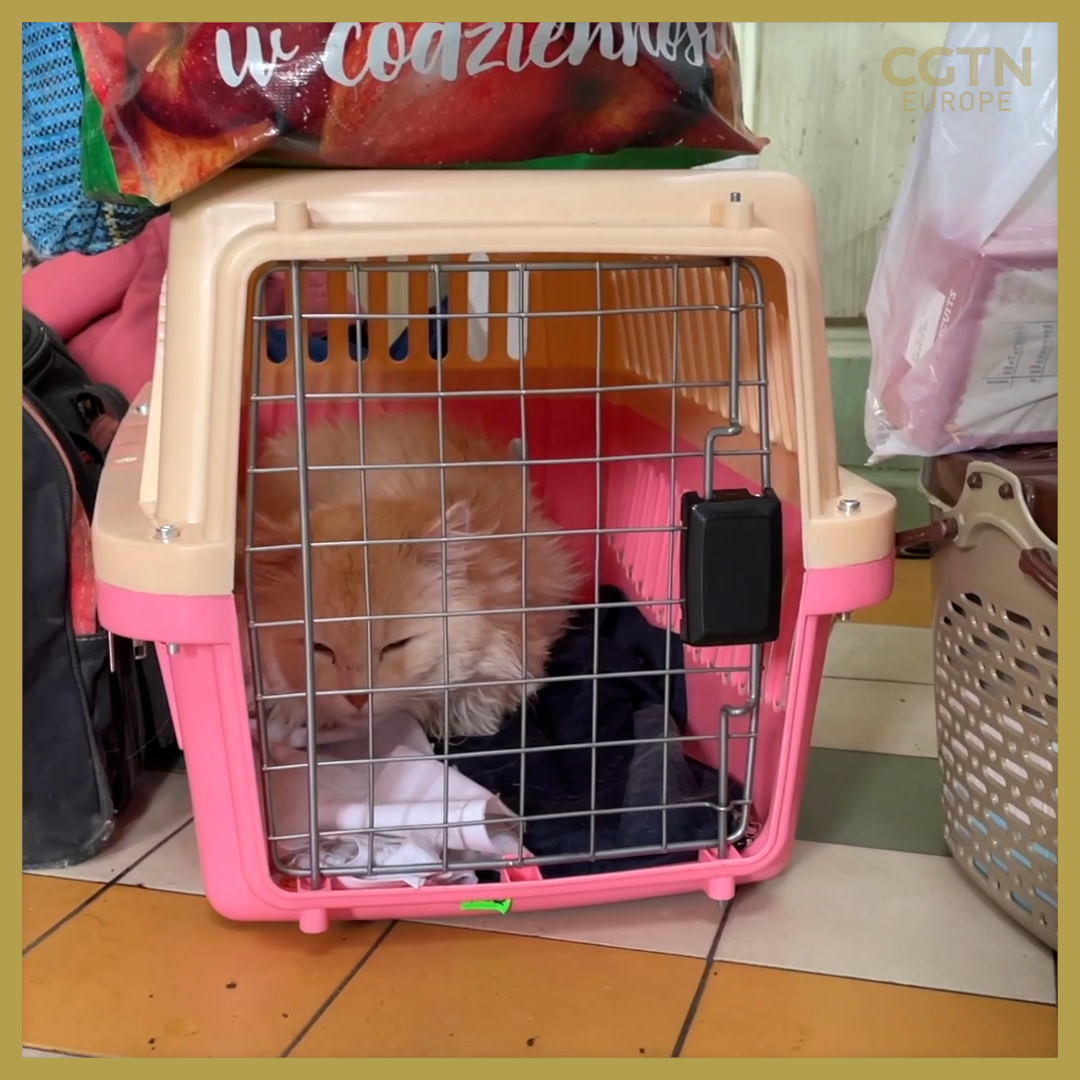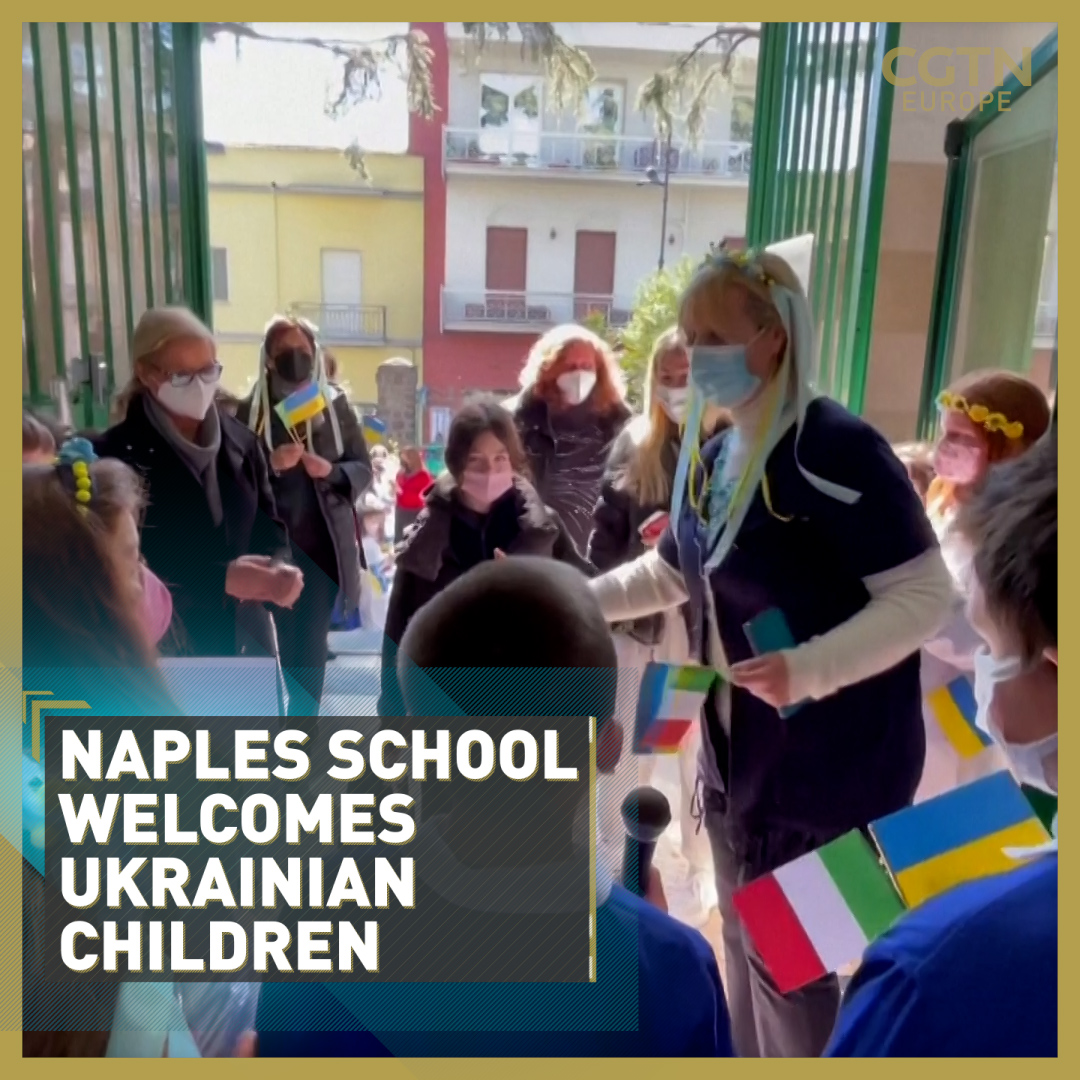
Rescuers work at the site of a Kharkiv warehouse after shelling on March 16. /Vitalii Hnidyi/Reuters
Rescuers work at the site of a Kharkiv warehouse after shelling on March 16. /Vitalii Hnidyi/Reuters
HEADLINES
• Russia and Ukraine both emphasize new-found scope for compromise, with peace talks set to resume on Wednesday
• That would be a third successive day of talks; no previous rounds have lasted more than one day
• Ukraine's President Volodymyr Zelenskyy said the talks were becoming "more realistic" while Russian Foreign Minister Sergei Lavrov said there was "hope for compromise"
• Neutral status for Ukraine – a major Russian demand – is on the table but Zelenskyy demands "real security guarantees that will work"
• In a speech to Congress, Zelenskyy asked the U.S. to "close the sky over Ukraine"
• U.S. President Joe Biden has signed into law a bill giving $800m in military assistance to Ukraine and said the U.S. would help it acquire drones and longer-range anti-aircraft systems.
• Russian President Vladimir Putin attacked "hypocritical talk" of Western countries, whom he accused of having hostile political goals
• NATO defense ministers consider plans to bolster the bloc’s eastern flank, but no intention of deployment in Ukraine
• Meanwhile, several explosions rocked Kyiv, with emergency services saying two residential buildings were damaged and two people wounded
• The Ukrainian capital was placed under curfew late Tuesday due to what its mayor called a "difficult and dangerous moment"
• About 20,000 civilians have managed so far to leave the besieged city of Mariupol in private cars, the interior ministry said
• Ukraine's Deputy Prime Minister Iryna Vereshchuk says it is an "open question" whether a "humanitarian corridor" from Mariupol would be opened
• Vereshchuk also said Russian forces in control of a hospital were keeping 400 staff and patients held "like hostages"
• Regional officials in Zaporizhzhia report that Russian forces are targeting the city, seen as a safe haven for those fleeing Mariupol
• U.S. defense secretary pledges his country and other NATO members will keep helping Ukraine, while adapting the alliance's own security to the "new reality" triggered by the situation
• A U.S. Air Force cargo jet began shipping helmets and other non-lethal military kit donated by Japan to Ukraine
• The prime ministers of Czechia, Poland and Slovenia spoke to European Council President Charles Michel immediately after returning from the Ukrainian capital Kyiv, insisting on "further, urgent measures"
• Swiss government says its sanctions list "now fully mirrors that of the EU"
• President of the International Committee of the Red Cross arrives in Kyiv on a five-day visit to insist on greater humanitarian access and protection of civilians

The situation as of 0800 GMT on March 16. /Simon Malfatto, Paz Pizarro, Cléa Peculier, Kenan Augeard/AFP
The situation as of 0800 GMT on March 16. /Simon Malfatto, Paz Pizarro, Cléa Peculier, Kenan Augeard/AFP
IN DETAIL
'Hope for compromise' in peace talks
Russia and Ukraine both emphasized new-found scope for compromise on Wednesday as peace talks were set to resume three weeks into a Russian assault on Ukrainian.
Ukraine's President Volodymyr Zelenskyy said the talks were becoming "more realistic", while Russian Foreign Minister Sergei Lavrov said there was "some hope for compromise", with neutral status for Ukraine – a major Russian demand – now on the table.
Compromise was also mentioned by Mykhailo Podolyak, an advisor to Zelenskyy and a negotiator in the talks. "We'll continue tomorrow," he tweeted late on Tuesday. "It's a very difficult... negotiation process. There are fundamental contradictions but there is certainly room for compromise."
In a video address on Wednesday, Zelenskyy said: "We can and must negotiate a just but fair peace for Ukraine, real security guarantees that will work."
Three weeks after beginning their military operations, Russian troops have been halted at the gates of Kyiv, having taken heavy losses and failed to seize any of Ukraine's biggest cities in a conflict Western officials say Moscow thought it would win within days.

A tear drop rolls down a young woman's cheek on board a bus after fleeing from Ukraine to Romania. Reuters/Clodagh Kilcoyne
A tear drop rolls down a young woman's cheek on board a bus after fleeing from Ukraine to Romania. Reuters/Clodagh Kilcoyne
Ukrainian officials have expressed hope this week that Moscow was coming to terms with its failure to topple the Kyiv government and its lack of fresh troops to keep fighting.
Talks were due to resume on Wednesday by video link for what would be a third straight day, the first time they have lasted more than a single day, which both sides have suggested means they have entered a more serious phase.
"The meetings continue, and, I am informed, the positions during the negotiations already sound more realistic. But time is still needed for the decisions to be in the interests of Ukraine," Zelenskyy said.
Zelenskyy had hinted at a possible route for compromise, suggesting Ukraine would be willing to accept international security guarantees that stopped short of its longstanding hope for full admission to the NATO alliance.
Keeping Ukraine out of NATO was long one of Russia's main demands in the months before it launched what it calls a "special operation" to disarm and "denazify" Ukraine.
"The negotiations are not easy for obvious reasons," Lavrov told media outlet RBC news. "But nevertheless, there is some hope of reaching a compromise."
"Neutral status is now being seriously discussed along, of course, with security guarantees," Lavrov said. "Now this very thing is being discussed in negotiations - there are absolutely specific formulations which in my view are close to agreement."
01:04

Deal could depend on Ukrainian 'neutrality'
Ukraine and Russia have had fruitful discussions on a 15-point peace plan including Kyiv declaring neutrality and renouncing its ambitions to join NATO, the Financial Times reports, citing three people involved in the talks.
The reported plan would involve Ukraine accepting limits on its military and pledging not to host foreign forces, bases or weaponry. However, there could be disagreements over the nature of western security guarantees to Ukraine, along with the status of territories that have been under the control of Russia and its proxies since 2014.
Zelenskyy's adviser Mykhailo Podolyak told the Financial Times that any deal would involve "the troops of the Russian Federation in any case leaving the territory of Ukraine," referring to southern regions bordering the Azov and Black seas, along with areas to the east and north of Kyiv.
Kremlin spokesman Dmitry Peskov had earlier raised the idea of neutrality for Ukraine based on the status of Austria or Sweden – "This option is really being discussed now, and is one that can be considered neutral" – while Russia's foreign minister Sergei Lavrov said that "absolutely specific wordings" were "close to being agreed" in the negotiations.
Russian news agencies quoted Peskov as saying in response to the Financial Times report that it is too early disclose any set of potential agreements between Moscow and Kyiv.
Zelenskyy pleads with U.S. Congress for no-fly zone
Ukrainian President Volodymyr Zelenskyy addressed the U.S. Congress on Wednesday, urging politicians to do more to protect his country and pleading with president Joe Biden to be the world's "leader of peace."
Continuing to push for a no-fly zone over Ukraine, Zelenskyy said in his virtual address that "Russia has turned the Ukrainian sky into a source of death for thousands of people," before showing graphic footage of death and destruction that ended with "close the sky over Ukraine."
"Is this a lot to ask for – to create a no-fly zone over Ukraine to save people? Is this too much?" Zelenskiy asked. He also requested more planes and defense systems, along with more economic sanctions against Russia, before closing his address with a direct plea in English to Biden: "I wish you to be the leader of the world. Being the leader of the world means to be the leader of peace."
03:10

Putin attacks the 'hostile' West's 'hypocrisy'
Russian President Vladimir Putin said on Wednesday that his country was ready to discuss Ukraine's neutral status, but insisted its military operation was "going to plan" and would still meet its objectives.
Putin also maintained the West would not succeed in what he called its attempt to achieve global dominance and dismember Russia.
"Behind the hypocritical talk and today's actions of the so-called collective West are hostile geopolitical goals. They just don't want a strong and sovereign Russia," Putin said, in remarks to government ministers that were broadcast on state television. "The West doesn't even bother to hide that their aim is to damage the entire Russian economy, every Russian."
In his most explicit acknowledgment of the pain inflicted by Western sanctions, Putin said inflation and unemployment would rise, but promised support to families with children. He also said Russia's central bank does not need to print money and the country has enough financial resources to fight current challenges.
"Our economy and business have all necessary resources to meet all the goals set, challenges should only mobilize us," he said, adding that the Russian economy would adapt to the new reality triggered by western sanctions on Moscow.
NATO members plan new defense strategy
NATO defense ministers have asked military commanders for plans to bolster the bloc's eastern flank, secretary-general Jens Stoltenberg said.
"On land, our new posture should include substantially more forces in the eastern part of the alliance, at higher readiness, with more pre-positioned equipment and supplies," Stoltenberg told reporters after a meeting of defense ministers.
However, Stoltenberg said NATO had no plans to send forces to Ukraine, despite Poland calling for it to deploy a peacekeeping mission. "We call on Russia, on President Putin to withdraw its forces, but we have no plans of deploying NATO troops on the ground in Ukraine," Stoltenberg said.
02:54

Fighting continues in several cities
Several explosions rocked Kyiv early Wednesday, with emergency services saying two residential buildings were damaged and two people wounded.
The blasts came as Russia intensified attacks on the Ukrainian capital, which was placed under curfew late Tuesday due to what its mayor called a "difficult and dangerous moment."
At least three loud explosions were heard just after dawn in the western part of the city, and thick clouds of smoke billowed into the sky.
"Two residential buildings were damaged in an overnight bombardment in the central part of Kyiv, Shevchenkivskyi district. Two people reported wounded, 35 evacuated," the Ukrainian state emergency service said on Telegram.
Nearly three weeks after beginning their military operations in Ukraine, Russian forces hemming in Kyiv on two sides have stepped up their attacks, with many in the capital fearing a full-on assault could come soon. Battles continue to rage in the cities of Mariupol, Kharkhiv and Mykolaiv, as well as in suburban towns just outside Kyiv.
About 20,000 civilians have managed so far to leave the besieged city of Mariupol in private cars, Interior Ministry adviser Vadym Denysenko said on Wednesday. Residents have been trapped in the southern port city by Russian shelling without heating, electricity and running water for most of the past two weeks, Ukrainian officials say.
At least 200,000 are in urgent need of evacuation, according to official Ukrainian estimates earlier this week, but on Wednesday a senior Ukrainian official said it was an "open question" whether a "humanitarian corridor" would be opened.
Deputy Prime Minister Iryna Vereshchuk also said in a video address that Russian forces were in control of a hospital which they captured on Tuesday in Mariupol, and that 400 staff and patients there were being held "like hostages".
Meanwhile, regional officials in Zaporizhzhia, seen as the first safe port of call for those fleeing Mariupol, have reported that Russian forces are targeting the southern city.
"Civilian objects have been bombed for the first time in Zaporizhzhia," the regional governor Alexander Starukh wrote on the Telegram social media platform. "The rockets landed in the area of the Zaporozhye-2 railway station," he added, specifying that there were no casualties.
01:06

Round-up of other global reaction
The United States and other NATO members said on Wednesday they would keep helping Ukraine fight off Russia's military action, while also adapting the alliance's own security to the "new reality" triggered by the situation. Diplomats and military analysts estimate that NATO allies have sent more than 20,000 anti-tank and other weapons to Ukraine since fighting began on February 24.
"We remain united in our support of Ukraine," U.S. Defense Secretary Lloyd Austin said as he arrived at an emergency meeting of NATO defense ministers in Brussels. "We support their ability to defend themselves and will continue to support them." NATO countries will continue to deliver weapons to Ukraine even as those deliveries could become the target of Russian attacks, Dutch defense minister Kajsa Ollongren told reporters, adding: "Ukraine has the right to defend itself."
A U.S. Air Force cargo jet began shipping helmets and other non-lethal military kit donated by Japan to Ukraine, marking the first time an American aircraft has carried Japanese Self Defense Force gear to another country. A C-17 transport jet flew from the United States to touch down at the Yokota air base near Tokyo, and picked up three truckloads of plastic-wrapped boxes. Japan's government declined to list the equipment inside.
"We won U.S. military support to use their planes so we are sending them on those aircraft so the equipment can arrive as soon as possible," said Makoto Oniki, Japan's vice minister of defense.
00:50

The prime ministers of Czechia, Poland and Slovenia spoke to European Council President Charles Michel immediately after returning from the Ukrainian capital Kyiv, a Polish government spokesperson said on Wednesday. "It is necessary to take further, urgent measures for Ukraine," Piotr Muller wrote on Twitter.
Neutral Switzerland has adopted more European Union sanctions against Russian individuals and entities published on Tuesday. "Switzerland's list of sanctions now fully mirrors that of the EU," the Swiss government said, adding the individuals sanctioned included further oligarchs and prominent business people whose assets in Switzerland must be frozen as of midday.
A law that enabled Russian oligarch Roman Abramovich to become a Portuguese citizen by claiming descent from Sephardic Jews has been altered, but the changes will not be retroactive, the foreign minister said. "The decree introduces a requirement for (applicants to have an) effective connection with Portugal," Foreign Minister Augusto Santos Silva said, describing it as a "mechanism" to prevent the law being "manipulated."
Peter Maurer, the president of the International Committee of the Red Cross (ICRC), has arrived in Kyiv on a planned five-day visit to Ukraine to insist on greater humanitarian access and protection of civilians.
"After enormous suffering by the civilian population and after our intensive virtual conversations with the Russian and Ukraine governments, I find it utterly important that we have person-to-person contacts, that we are able to go in-depth into the understanding of neutral, independent and impartial humanitarian work, and that our license to operate in the country is fully understood by the authorities," Maurer said.
Source(s): Reuters
,AFP

